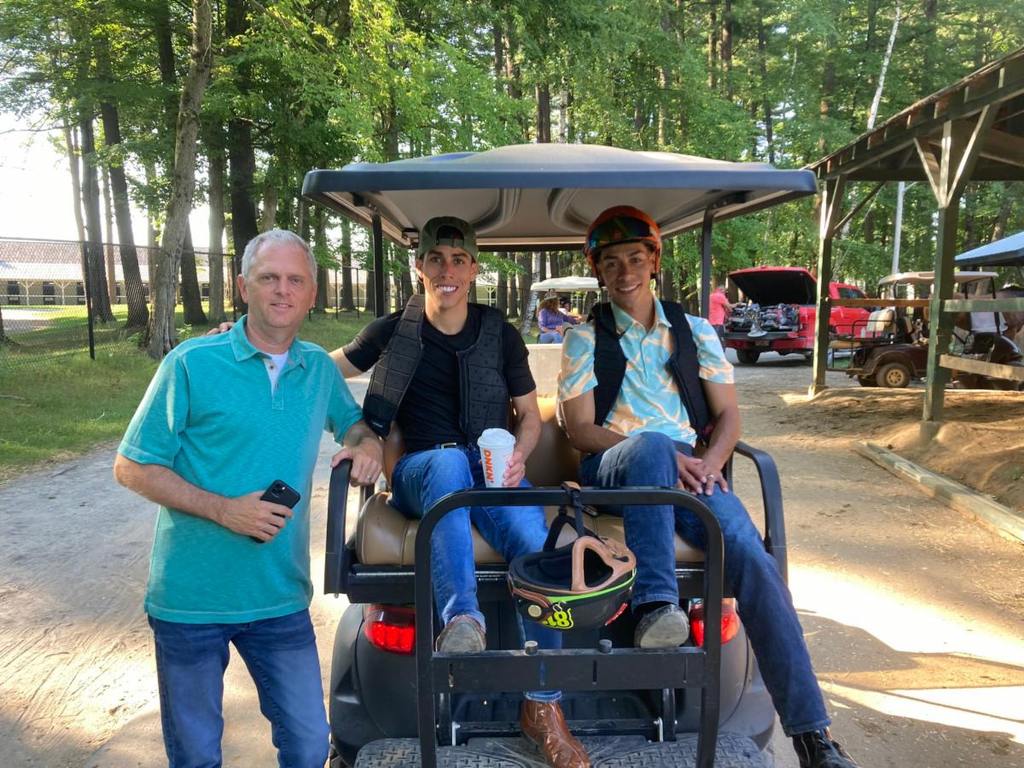
Photo of Steve Rushing [left], Irad Ortiz, Jr. and Jose Ortiz courtesy of Joe McKay
By Lynne Snierson
OZONE PARK, N.Y. – Just four live race days remain in 2023 to complete a remarkable year of racing action on the New York Racing Association, Inc. (NYRA) circuit. To celebrate the season, the NYRA Press Office checked in with a selection of trainers, owners, jockeys and racing personalities to share their reflections on the memorable year.
Steve Rushing has been a successful jockey agent for almost 40 years and during that time the riders he has taken the books for include Hall of Famers Edgar Prado and Ramon Dominguez as well as Rosie Napravnik and Tammi Piermarini.
Currently, Rushing represents the Eclipse Award-winning brothers Irad Ortiz, Jr. and Jose Ortiz, who have both risen to the top of the ranks on the NYRA circuit and in North America.
Irad, the Eclipse Award winner in 2018, 2019, 2020 and 2022, is wrapping up his most successful season to date with a career-high 360 wins through December 27 while breaking his single-season North American record for purse earnings in excess of $38 million. Irad’s 15 Grade 1 scores in 2023 include the Whitney at Saratoga Race Course aboard White Abarrio and three Breeders’ Cup events with White Abarrio [Classic] and Champions Elite Power [Sprint] and Goodnight Olive [Filly & Mare Sprint]. Seven of Irad’s 15 Grade 1 victories were on NYRA racing strips.
Jose, the Champion jockey of 2017, is also concluding a stellar year with 245 wins and more than $22 million in earnings to date. His four Grade 1 wins include the Belmont Invitational Derby [Far Bridge] and the New York [Marketsegmentation].
This summer, the Rushing-represented Ortiz brothers finished 1-2 in the riding standings at two of NYRA’s most prestigious meetings. Jose claimed victory over Irad at the Belmont spring/summer meet with 59 wins after a close battle that went down to the final day of racing. Two months later, it was Irad who took the Angel Cordero, Jr. Award as leading rider at Saratoga with 62 wins as Jose finished second.
Q: Is there any other single agent who simultaneously has had the books of two brothers, and moreover, brothers who are both at the top of this game?
Rushing: “This is probably a first. I can’t think of anyone else. To begin with, there aren’t too many brothers who are riders, and then are both at the top of the mountain, and then to be represented by the same agent. It is unique. I’ve represented some very good riders. I’ve been very fortunate to work with both Jose and Irad.”
Q: Are the Ortiz brothers, who are recognized and respected for their work ethic as well as their immense ability in the irons, the gifts that keep on giving?
“They are really special. They are great, great kids. They are both outstanding jockeys and outstanding people who come from a great family. They are very special, that’s for sure. They make my job easier because they are both very professional and they do the right things. As great as they are as riders, they are even better human beings and that says a lot.”
Q: Irad and Jose are not just brothers; they are best friends and as tight as can be. They support one another in every way. But when they are out on the track, they are known to be intensely competitive with one another. Is that a racetrack rumor or the truth?
“They are so competitive that it’s crazy. It really is. They are so close but so competitive, and not just when riding. Whatever they do, and it doesn’t matter what it is, they are crazy competitive. It’s great, though.”
Q: They are both very much in demand. How is it when they both want to be on the same superstar horse – horses like Champions, back-to-back Breeders’ Cup winners, and multiple New York Grade 1 stakes-winners Elite Power and Goodnight Olive – and Irad gets those mounts?
“They both always want to be on those kinds of horse, but they both understand the game. They never question anything. They just go with the flow. I’ve told them that one week, things might work in Irad’s favor and then the next week, they’ll work in Jose’s favor. It all balances out in the end.”
Q: The trainers and owners are the decision makers as to who rides their horses, so how important is it to maintain solid relationships with them to best benefit each brother?
“It’s very important. If Jose and Irad are going after the same mount, I’ll tell the trainers that both guys are available, if they are, and then let the trainer and owner decide.”
Q: The job of a jockey agent is hardly an easy one. It’s demanding and extremely competitive, and at times contentious. Often it can be akin to doing a balancing act on a high wire. Are communication and honesty the biggest keys to your success?
“Definitely. It’s very important to be a good communicator, for sure. Being up front and straight with people is the best way to be. That’s really the only way to be. It can be with riders like Irad and Jose that if someone gives them a call and then there’s a problem, they really don’t want to give up the call. They want to honor it. It’s easy to get on the horses but sometimes it’s hard to take off the horses.”
Q: Your job is seven days a week, 52 weeks a year. You set up the morning work schedules as well as the afternoon riding assignments for the brothers. You have to look out for potential conflicts and stay ahead of the curve. How much homework is necessary?
“All day you’re doing something, and it is every day. These guys ride out of town a lot so there is also a lot of traveling involved. There’s really a lot to it. For instance, Irad can be at Santa Anita the same day that Jose is at Gulfstream. They both stay very busy.
“There’s a lot of handicapping the races involved and you have to be pretty good at it. But it doesn’t always come down to that. There might be a situation where this horse you think is better but your relationship with another trainer is better and he has a lot more horses. Even when you handicap, you don’t always ride the horse you think is fastest. Sometimes it comes down to relationships.”
Q: Even the best handicapper has to adjust to weather and surface changes, late scratches, medication, equipment and/or shoe changes, and all sorts of last-minute surprises. But you have to dig into each race and book mounts for your guys weeks before race days and you don’t even have the benefit of past performances. How do you do it?
“You don’t know who’s going to be in the field, post positions, first time Lasix, blinkers on or off, if the race is going to be rained off the turf, scratches, PPs, or any of it. The favorite only wins 33 percent of the time, and that’s when the gamblers and handicappers know who’s in the race, who’s getting first time Lasix, who’s getting blinkers, the post positions, the weather, track conditions, and the rest. They have all that information and they still only come up with the winner 33 percent of the time. We’re doing it weeks in advance when we don’t have any of that information. That makes it very difficult.”
Q: What’s your typical day like?
“I’m there at the track at 6:00 or 6:30 in the morning. I look at the entries and condition book for the day to see what’s going on or if we have any conflicts. I download the DRF into my iPad and go over the races. I make lots of phone calls and texts all day long. Ever since COVID they [racing officials] started doing the draw by Zoom [instead of having to be physically in the racing office] and that’s a big help. I can do a lot of it now while sitting in my office.
“I have every condition book from all the tracks we ride all over the country, every stakes nomination, every racing form, all of it in my computer. I keep my computer, my notes, and everything in front of me and have multiple TVs with the races from different tracks on at the same time. I watch the races and mark down when the horses will be running back. I go over all the charts. It’s an all day job. It’s seven days a week because even on the dark days, stakes nominations will come out. Some days are a little bit slower than others but there is always something going on every day.”
Q: You’re a Rhode Island native who held a variety of jobs that include hot walker, groom, and exercise rider at the tracks on the old New England circuit of Lincoln Downs, Narragansett Park, Rockingham Park and Suffolk Downs. Then you decided to try your hand as a jockey agent. Is the story that when you were a young and struggling agent you teamed up with a young and struggling Peruvian-born rider named Edgar Prado?
“That’s pretty much it. It was at Suffolk Downs in 1986. At the time I was working for Tammi Campbell, now Piermarini, and she was an apprentice. I was friends with [trainer] Bobby Klesaris and he said he was bringing this kid up from Florida and he thought the kid was going to be pretty good. He asked me to take him. Edgar and I started working together and though he spoke very little English and I spoke very little Spanish, we made it work. We became as close as brothers.
“After a few months we went to Florida to ride for Vinnie Blengs. Then Bobby called me again and said he was bringing a string of about 50 horses to Maryland and wanted us to go there and ride for him. It was only on a trial basis, but Edgar won on his very first mount. It paid $55. It all just snowballed after that.”
Q: When did you arrive in New York?
“Ramon [Dominguez] and I went up there in the winter in 2009. I’ve represented some very good riders. I’ve been very fortunate.”
Q: This winter, you have to keep up to snuff on opportunities, including with Triple Crown contenders, for Irad and Jose at multiple tracks like Aqueduct, Gulfstream, Tampa Bay Downs, Santa Anita, Oaklawn, Fair Grounds, and other simultaneous race meets. The tracks and the trainers are located in different time zones. That’s a lot to manage.
“There’s always racing going on somewhere. It’s great, isn’t it?”




